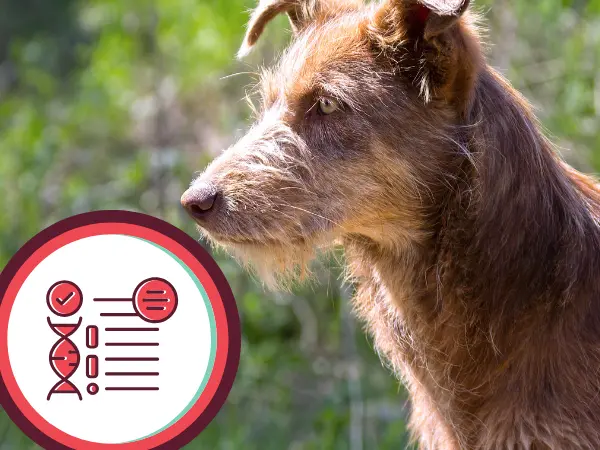Is your dog restless, showing destructive behavior, excessively barking, or accidentally peeing or eliminating inside the house? These are common signs of anxiety in dogs. Canine anxiety can be triggered by separation, changes in routine, past traumas and experiences, and more. The good news is that there are different ways to treat anxiety in dogs.
In this Sploot Vets guide, we discuss how we commonly treat anxiety in dogs, combining behavioral training recommendations and anxiety meds for dogs to create a sustainable treatment plan. We also break down the most common dog anxiety meds and how they work.

How Do You Treat Anxiety In Dogs?
The best way to treat anxiety in dogs combines behavioral training and anxiety meds for dogs; these help the dog adapt to situations or environments that usually cause anxiety for them. Anxiety meds for dogs can be used short-term or long-term, depending on the case and the type of medication.
Note: Some dog anxiety meds are formulated for people and used off-label by veterinarians. This is a standard and legal practice when there is a lack of alternatives that are formulated for dogs to produce the same benefits. Using medications this way is only safe if under veterinary guidance to prevent counterindications and overdose.
I. Short-Term Anxiety Meds for Dogs [As-Needed]
Some dog anxiety meds are intended for short-term or one-off usage. These are typically best for situational anxiety in dogs (e.g., fireworks, travel).
Short-term anxiety meds for dogs can also be used in conjunction with behavioral training to reduce social anxiety and separation anxiety in dogs.
Note: While some of the following short-term anti-anxiety meds for dogs can cause sleepiness, this is often considered a desired side effect to help the dog sleep through a typically distressing event (e.g., fireworks, travel).
1. Trazodone
- Drug Class: Serotonin antagonist and reuptake inhibitor (SARI)
- Usage: Short-term or as-needed for dog anxiety; works in 1 to 2 hours
- Duration of Anti-Anxiety Effects: Can last for 4 to 6 hours or more
- Can it make dogs sleepy? Yes, trazodone can make your dog sleepy at higher doses.
- Available on SplootRX online pet pharmacy. Get 35% off (up to $20) on your first order with the promo code AUTO35
To best understand how trazodone works for anxious dogs, it’s important to understand serotonin’s role. Serotonin is a neurotransmitter associated with a dog’s calmness, well-being, and confidence. (Conversely, low levels of serotonin is associated with aggression and anxiety.)
Trazodone, as a serotonin antagonist and reuptake inhibitor (SARI), increases serotonin in the dog’s brain, thus helping produce a calmer disposition. SARI dog anxiety meds like trazodone also block certain serotonin receptors to prevent side effects like insomnia.
2. Alprazolam (Xanax®)
- Drug Class: Benzodiazepine
- Brand: Xanax®
- Usage: Short-term or as-needed for dog anxiety; works in 30 minutes to 1 hour
- Duration of Anti-Anxiety Effects: Can last for 4 to 6 hours or more
- Can it make dogs sleepy?: Yes, alprazolam (Xanax) can make your dog sleepy.
Alprazolam, commonly known by its branded name, Xanax, is often used as an anti-anxiety medication for dogs. As a benzodiazepine, this medication slows down the dog’s central nervous system by enhancing the activity of the GABA neurotransmitter. This reduces anxiety, stress, and agitation in dogs.
3. Lorazepam (Ativan®)
- Drug Class: Benzodiazepine
- Brand: Ativan®
- Usage: Short-term or as-needed for dog anxiety; works in around 1 hour
- Duration of Anti-Anxiety Effects: Can last for 6 to 8 hours or more
- Can it make dogs sleepy?: Yes, lorazepam (Ativan®) can make your dog sleepy.
Lorazepam, also known by its branded version, Ativan, is among the commonly prescribed anxiety meds for dogs. Belonging to the benzodiazepine drug class, Lorazepam works by enhancing the activity of the GABA neurotransmitter, thus helping to reduce anxiety in dogs.
Because lorazepam belongs to the same drug class as alprazolam (Xanax), the two are often compared. One of the key differences is that lorazepam (Ativan) has a slightly longer half-life, meaning it is eliminated by the body at a slower rate. Thus, lorazepam (Ativan) tends to last longer for dogs, producing anti-anxiety effects for a few hours more than Xanax.
4. Gabapentin
- Drug Class: Anticonvulsant
- Usage: Short-term or as-needed for dog anxiety; works in 45 minutes to 2 hours. It can also be used long-term (as part of combination therapy) for chronic anxiety.
- Duration of Anti-Anxiety Effects: Can last for 4 to 6 hours or more
- Can it make dogs sleepy?: Yes, gabapentin can make your dog sleepy
- Available on SplootRX online pet pharmacy. Get 35% off (up to $20) on your first order with the promo code AUTO35
Even though gabapentin is more commonly used to manage seizures and nerve pain, it can also be used as an anti-anxiety medication for dogs. As an anticonvulsant medication, gabapentin reduces the activity of excitatory neurotransmitters like glutamate and noradrenaline. As a result, gabapentin helps quiet down overactive nervous systems and produces a calmer disposition.
5. Dexmedetomidine (Sileo®)
- Drug Class: Alpha-2 adrenergic agonist
- Brand: Sileo® (no generic version available)
- Usage: Short-term or as-needed for dog anxiety; works in 30 minutes to 1 hour.
- Duration of Anti-Anxiety Effects: Can last for 1 to 3 hours
- Can it make dogs sleepy? Yes, dexmedetomidine or Sileo can make your dog sleepy.
- Available on SplootRX online pet pharmacy. Get 35% off (up to $20) on your first order with the promo code AUTO35
Dexmedetomidine, also known as Sileo, is a dog anxiety medication, specifically formulated for canine use. It is an alpha-2 adrenergic agonist, which means that it activates receptors in the brain that ultimately reduce the release of norepinephrine, a stress hormone. By reducing norepinephrine, dexmedetomidine or Sileo helps promote a calmer, less anxious state in dogs.

II. Long-Term Anti-Anxiety Meds for Dogs
Some dog anxiety meds can be prescribed for long-term, regular use. These anti-anxiety medications can be administered for several weeks to months, often with a daily dosage (instead of situational or one-off use). It is common for veterinarians to prescribe long-term medications for severe, generalized, or age-related dog anxiety.
Note: Some long-term dog anxiety meds (i.e., SSRIs, TCAs) can take several weeks to produce the desired effects, while others produce anti-anxiety effects from day one. This depends entirely on their drug class and mode of action.
Additional Note: In some cases, veterinarians can combine long-term dog anxiety meds with compatible short-term anxiety meds for dogs if needed. For example, a dog with generalized anxiety already has a daily dosage of fluoxetine as part of their treatment plan. However, during travel, the veterinarian may prescribe trazodone to be given as-needed.
1. Fluoxetine (Prozac®, Reconcile®)
- Drug Class: Selective Serotonin Reuptake Inhibitor (SSRI)
- Brands: Prozac®, Reconcile®
- Usage: Long-term usage for severe social or generalized dog anxiety; takes several weeks to reach full effect.
- Available on SplootRX online pet pharmacy. Get 35% off (up to $20) on your first order with the promo code AUTO35
Fluoxetine, also known as Prozac or Reconcile, is a commonly prescribed long-term anti-anxiety medication in dogs. It is an SSRI (Selective Serotonin Reuptake Inhibitor), meaning it decreases the reuptake of serotonin, thus gradually boosting the amount of serotonin in the dog’s brain.
Because serotonin is a neurotransmitter associated with calmness, this medication helps reduce chronic or generalized dog anxiety over time.
2. Buspirone (BuSpar®, Bustab®)
- Drug Class: Non-benzodiazepine anxiolytic
- Brands: BuSpar®, Bustab®
- Usage: Long-term usage for moderate generalized or social dog anxiety; takes several weeks to reach full effect.
Buspirone is an anxiolytic (anti-anxiety medication) that works by gently stimulating serotonin receptors in the dog’s brain. Eventually, this leads to an increase of serotonin over time, helping reduce canine anxiety and promote a sense of well-being.
While this mode of action is slightly similar to SSRIs like fluoxetine, buspirone is considered milder than SSRIs and is often prescribed for less severe cases of generalized dog anxiety or if the dog is sensitive to SSRIs.
3. Clomipramine (Clomicalm®)
- Drug Class: TCA (Tricyclic Antidepressant)
- Brands: Clomicalm®
- Usage: Long-term usage for separation anxiety in dogs or generalized dog anxiety; takes several weeks to reach full effect.
- Available on SplootRX online pet pharmacy. Get 35% off (up to $20) on your first order with the promo code AUTO35
Clomipramine is an anti-anxiety medication for dogs, classified as a TCA (Tricyclic Antidepressant). It works by blocking the reuptake of serotonin and norepinephrine. This dual action helps stabilize mood and improve stress resilience in dogs over time.
While clomipramine is effective in some cases, it can also produce more side effects than SSRIs due to its broader impact on neurotransmitters. This is why it’s always best to consult a trusted veterinarian before using this type of anti-anxiety medication for your dog.
4. Selegiline (Anipryl®)
- Drug Class: Monoamine Oxidase Type B Inhibitor (MAO-B inhibitor)
- Brand: Anipryl®—formulated for dogs; Eldepryl®, Zelapar®, Deprenyl®—formulated for humans but can be used off-label for dogs too
- Usage: Long-term usage for cognitive dysfunction and age-related dog anxiety – takes several days or a few weeks to reach full effect.
- Available on SplootRX online pet pharmacy. Get 35% off (up to $20) on your first order with the promo code AUTO35
While selegiline or Anipryl is NOT technically one of the anxiety meds for dogs, it is often prescribed for age-related dog anxiety resulting from cognitive dysfunction.
Selegiline or Anipryl is a Monoamine Oxidase Type B inhibitor (MAO-B inhibitor). MAO-B is a type of enzyme that breaks down dopamine and other neurotransmitters, causing cognitive decline in some older dogs. By inhibiting this enzyme, selegiline or Anipryl increases dopamine levels, which supports alertness, motivation, and emotional stability in dogs with cognitive dysfunction.
Note: Looking to get a prescription refill for your dog’s long-term anxiety meds? At Sploot Vets, this is easier than ever with the medication refill feature on the Sploot Vets app.

III. Over-The-Counter (OTC) Anxiety Meds For Dogs
Prescription anxiety meds for dogs are commonly stronger and more reliable than OTC or over-the-counter anxiety meds for dogs. OTC dog anxiety meds are essentially calming supplements for dogs and tend to have a milder effect. Most of these need to be given daily, days or weeks in advance to produce the desired calming effects.
Note: While OTC anxiety meds for dogs do NOT require a prescription, it’s always best to consult a veterinarian before using them to ensure proper dosing and avoid contraindications.
1. Zylkene Capsules
- Type: Calming supplement (capsules); OTC anxiety meds for dogs
- Usage: Short-term or several months, depending on vet recommendations; given at least 5 to 7 days before the stressful event
- Can it make dogs sleepy? No, Zylkene capsules are formulated to be non-sedating.
- Available on SplootRX online pet pharmacy. Get 35% off (up to $20) on your first order with the promo code AUTO35
Zylkene capsules are a well-known calming supplement for dogs. Their active ingredient is Alpha-Casozepine, a lactose-free derivative of milk. Alpha-casozepine helps promote calmness and relaxation in dogs with mild anxiety by supporting natural calming pathways in the brain, similar to how certain peptides in milk help soothe nursing puppies.
2. Solliquin® Soft Chews
- Type: Calming supplement (chews); OTC anxiety meds for dogs
- Usage: Short-term or long-term; given days or weeks before the stressful event, according to your vet’s recommendations
- Can it make dogs sleepy? No, Solliquin soft chews are formulated to be non-sedating.
- Available on SplootRX online pet pharmacy. Get 35% off (up to $20) on your first order with the promo code AUTO35
Solliquin Soft Chews is an OTC calming supplement that helps dogs manage mild anxiety. It contains various natural ingredients that help promote a calmer disposition.
These ingredients include L-theanine and whey protein concentrate, which boost the production of calming neurotransmitters in the brain. In addition, Magnolia extract and Phellodendron help reduce the stress hormone, cortisol, to promote relaxation.
→ Learn more - 5 Calming Treats, Chews & Supplements For Dogs [Vet-Approved]

What are the Different Types of Dog Anxiety?
There are 5 main types of anxiety in dogs, all of which can be supported by vet-recommended dog anxiety meds, along with training, counterconditioning, or desensitization. The main categories of dog anxiety include the following:
1. Separation Anxiety in Dogs
Separation anxiety in dogs is triggered when a dog is left alone or separated from their owner. This often happens due to work or school obligations that reduce the time the dog is with their pet parent. Common signs of this type of dog anxiety include pacing, barking, destructive chewing, accidents indoors, and/or refusal to eat when left alone.
2. Social Anxiety in Dogs
Dogs with social anxiety feel excessively nervous or fearful around unfamiliar people, dogs, or environments. This is often observed in dog parks, doggy daycare, or holiday gatherings. Signs of this type of dog anxiety include hiding, trembling, and/or aggression around unfamiliar people or pets.
3. Situational Anxiety in Dogs
Situational anxiety in dogs is triggered by specific events or environments, such as thunderstorms, fireworks, car rides, or visits to vet clinics (however, a Fear Free vet clinic can help reduce anxiety in less severe cases). The dog’s fear response is short-term but intense in this type of dog anxiety..
Signs of situational anxiety in dogs include trembling, barking, hiding, accidents indoors, barking, whining, and trying to escape.
4. Generalized Anxiety in Dogs
Generalized anxiety in dogs is a chronic form of dog anxiety wherein the dog is persistently uneasy or “on edge”, even without an obvious trigger. Dogs with generalized anxiety will often pace, tremble, and be overly alert to sounds or movement. This type of canine anxiety is constant and can be linked to genetics, past trauma, or lack of stability.
5. Age-Related Dog Anxiety (Cognitive Dysfunction)
Older dogs may develop anxiety due to cognitive decline. Some of the most common signs of age-related dog anxiety include restlessness, changes in sleep patterns, clinginess, excessive vocalization, and disorientation.
Final Thoughts on Anxiety Meds for Dogs
The right anxiety medication for your dog can make a meaningful difference in their quality of life. However, finding the right one can take time and expert veterinary guidance. Every dog’s brain chemistry and stress triggers are unique, which means the best medication will vary from one pet to another.
In addition, while dog anxiety meds can help promote a calmer disposition, they often work best (and more sustainably) when paired with behavioral training, especially in cases of chronic or generalized dog anxiety. Sploot Medical Director Dr. Amy Casali explains: “We first diagnose the type of behavioral disorder, exclude other medical causes, and then treat the behavioral disorder with a behavioral modification plan.”
Dr. Casali further states: “Generally, dog anxiety meds must always be combined with behavioral modification. By reducing anxiety, medications help boost neuroplasticity and enable learning. Therefore, the sooner a medication is started, the more likely we are to be successful with behavioral modification.”
Note: In some cases, long-term and short-term dog anxiety medications can be used together.

Sploot Vets: All-in-One Care, Including Your Dog’s Well-Being
Sploot Vets provides top-tier, all-in-one vet care that looks after your dog’s physical health and well-being. Aside from wellness exams and behavioral consultations, we handle more than 95% of your pet’s care needs, including preventative care, urgent care, and emergency vet services.
If your dog is struggling with anxiety, and you’re considering getting them dog anxiety meds, we’re here to help. We offer a positive, comfortable vet care experience with our Fear Free certified medical team and serene clinic environment.
We have conveniently located vet clinics in Denver, Chicago, and Colorado Springs, open 365 days a year with extended hours.
Book your appointment online or through the Sploot Vets pet care app today!






